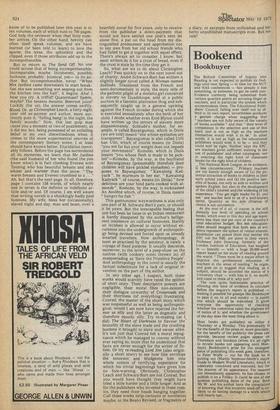Bookend
Bookbuyer
The Bullock Committee of Inquiry into Reading is not expected to publish its findings until next Spring — in time for the NUT and NAS conferences — but already it has something, or someone, to get its teeth into. Evidence currently being submitted from various quarters points an accusing finger at teachers, and in particular the system which accommodates them. The Educational Publishers' Council. falling over itself not to offend in its own report, nevertheless produces a genteel charge when suggesting that " teachers are not fully aware of the variety of books available" and that "their level of competence in the selection and use of this basic tool is not as high as the teachers themselves would wish it to be." In other words, it is not as high as the educational publishers would wish it to be — and they could well be right. Neither, says the EPC, are teachers given sufficient training in the use of publishers' and other catalogues, nor in selecting the right kind of classroom books for the right kind of children.
_ The National Book League, in its evidence, is less circumlocutory: " Primary teachers are not keenly enough aware of (a) the potential attraction of books to children in their early school years and (b) the positive benefits of books, not only as aids to written and spoken English, but also to the development of the child's interest and the widening of his. experience. 'You get eight books for El, you see' one teacher said to us of a well-known series. Quantity as the sole criterion of choice is not uncommon . .
At the root of it all, of course, is the still dismally low level of spending on school books, which even in this day and age repre
sents less than one per cent of the country's total education budget. But lest educationalists should imagine that both sets of evidence represent the spleen of vested interest, Bookbuyer can assure them that neither the EPC nor the NBL are alone in their views. Professor John Downing, formerly of the London Institute of Education, has weighed in — literally — with a huge 20.000-word report based on his study of reading around the world. "There must be a major effort to improve the professional education of teachers in the areas of reading" he urges, and goes on to suggest that reading, as a subject, should be accorded the status of a University chair — with him in it, no doubt, and come to think of it, why not? The now quite fashionable practice of allowing this kind of evidence to circulate before the inquiry's report is published — making it possible for gossips like Bookbuyer to pass it on to all and sundry — is surely one which should be welcomed. It gives everyone the opportunity of checking whether the committee takes the slightest bit of notice of it, and whether the government of the day does the least thing about it.
Most books are published on either a Thursday or a Monday. This presumably is for the benefit of the press or, more precisely. for the benefit of the publicity the press can provide, because review pages appear on Thursdays and Sundays (when it's all right to review books not appearing until Mondays). Bookbuyer's prize for the strangest piece of publishing this week goes, therefore. to Peter Wolfe — not for the book he is putting out (Martin Seymour-Smith's major Guide to Modern World Literature), which is admirably conceived and executed, but for the manner of its appearance. For reasons not irhmediately apparent, he has chosen to publish it on a Friday. It could be one of the quietest publishing dates of the year. Both Mr W. and his author have the consolation of knowing that this eccentric send-off is unlikely to do lasting damage to a work which will clearly last.


































 Previous page
Previous page